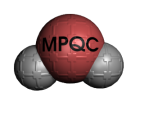Ecosyste.ms: Awesome
An open API service indexing awesome lists of open source software.
https://github.com/ValeevGroup/mpqc
The Massively Parallel Quantum Chemistry program, MPQC, computes properties of atoms and molecules from first principles using the time independent Schrödinger equation.
https://github.com/ValeevGroup/mpqc
Last synced: about 2 months ago
JSON representation
The Massively Parallel Quantum Chemistry program, MPQC, computes properties of atoms and molecules from first principles using the time independent Schrödinger equation.
- Host: GitHub
- URL: https://github.com/ValeevGroup/mpqc
- Owner: ValeevGroup
- Created: 2013-08-15T15:28:10.000Z (almost 11 years ago)
- Default Branch: master
- Last Pushed: 2023-08-08T17:05:04.000Z (11 months ago)
- Last Synced: 2024-03-27T10:06:05.246Z (3 months ago)
- Language: C++
- Size: 347 MB
- Stars: 64
- Watchers: 27
- Forks: 24
- Open Issues: 5
-
Metadata Files:
- Readme: README.md
- Changelog: CHANGES
- Citation: CITATION
Lists
- awesome-qc-programs - ValeevGroup/mpqc
- awesome-cpp-completed - MPQC - The Massively Parallel Quantum Chemistry program, MPQC, computes properties of atoms and molecules from first principles using the time independent Schrödinger equation. [GPL] [website](https://mpqc.org/) (Chemistry)
- awesome-cpp - MPQC - The Massively Parallel Quantum Chemistry program, MPQC, computes properties of atoms and molecules from first principles using the time independent Schrödinger equation. [GPL] [website](https://mpqc.org/) (Chemistry)
- awesome-cpp - MPQC - The Massively Parallel Quantum Chemistry program, MPQC, computes properties of atoms and molecules from first principles using the time independent Schrödinger equation. [GPL] [website](https://mpqc.org/) (Chemistry)
- awesome-cpp-completed - MPQC - The Massively Parallel Quantum Chemistry program, MPQC, computes properties of atoms and molecules from first principles using the time independent Schrödinger equation. [GPL] [website](https://mpqc.org/) (Chemistry)
- awesome-cpp - MPQC - The Massively Parallel Quantum Chemistry program, MPQC, computes properties of atoms and molecules from first principles using the time independent Schrödinger equation. [GPL] [website](https://mpqc.org/) (Chemistry)
- awesome-cpp - MPQC - The Massively Parallel Quantum Chemistry program, MPQC, computes properties of atoms and molecules from first principles using the time independent Schrödinger equation. [GPL] [website](https://mpqc.org/) (Chemistry)
- fucking-awesome-cpp - MPQC - The Massively Parallel Quantum Chemistry program, MPQC, computes properties of atoms and molecules from first principles using the time independent Schrödinger equation. [GPL] 🌎 [website](mpqc.org/) (Chemistry)
README
[](https://travis-ci.com/ValeevGroup/mpqc4)
[](https://codecov.io/gh/ValeevGroup/mpqc4)
# Synopsis

The Massively Parallel Quantum Chemistry (MPQC) platform is a research package for *ab initio* simulation of the electronic structure of molecules and periodic solids.
The current (4th) version of the package, sometimes referred to as __MPQC4__, is a modern reenvisioning of the conceptual design of the original MPQC platform using the massively-parallel tensor framework [TiledArray](https://github.com/ValeevGroup/tiledarray), distributed task-based programming model and runtime [MADWorld](https://github.com/m-a-d-n-e-s-s/madness), and the Gaussian integrals library [Libint](https://github.com/evaleev/libint).
# Developers
MPQC is developed by the [Valeev Group](http://research.valeyev.net) at [Virginia Tech](http://www.vt.edu).
# License
MPQC is freely available under the terms of the GPL v3+ licence. See the the included LICENSE file for details. If you are interested in using MPQC under different licensing terms, please contact us.
# How to Cite
See the CITATION file for the recommended citation.
The development of electronic structure methods in MPQC is partially described in the following publications:
* Cannada A. Lewis , Justus A. Calvin , and Edward F. Valeev, "Clustered Low-Rank Tensor Format: Introduction and Application to Fast Construction of Hartree-Fock Exchange.", *J. Chem. Theor. Comp.*, DOI 10.1021/acs.jctc.6b00884;
* Chong Peng, Justus A. Calvin, Fabijan Pavosevic, Jinmei Zhang, and Edward F. Valeev, "Massively Parallel Implementation of Explicitly Correlated Coupled-Cluster Singles and Doubles Using TiledArray Framework.", *J. Phys. Chem. A*, DOI 10.1021/acs.jpca.6b10150.
# Performance
Excellent strong scaling performance of the electronic structure methods in MPQC is demonstrated below for the coupled-cluster singles and doubles (CCSD) wave function solver. Parallel speed-up of 1 iteration of CCSD solver for uracil trimer in 6-31G* AO basis was measured on ["BlueRidge" cluster](https://secure.hosting.vt.edu/www.arc.vt.edu/computing/blueridge-sandy-bridge/) at Virginia Tech (wall time on 1 16-core node = 1290 sec):

This figure was obtained with the help of an allocation from [Advanced Research Computing](https://secure.hosting.vt.edu/www.arc.vt.edu/) at Virginia Tech.
# Acknowledgements
Development of MPQC and its key components is made possible by past and present contributions from the National Science Foundation (awards CHE-0847295, CHE-0741927, OCI-1047696, CHE-1362655, ACI-1450262, and ACI-1550456), the Alfred P. Sloan Foundation, the Camille and Henry Dreyfus Foundation, the Department of Energy Exascale Computing Project (NWChemEx subproject), and the Department of Energy INCITE Program.